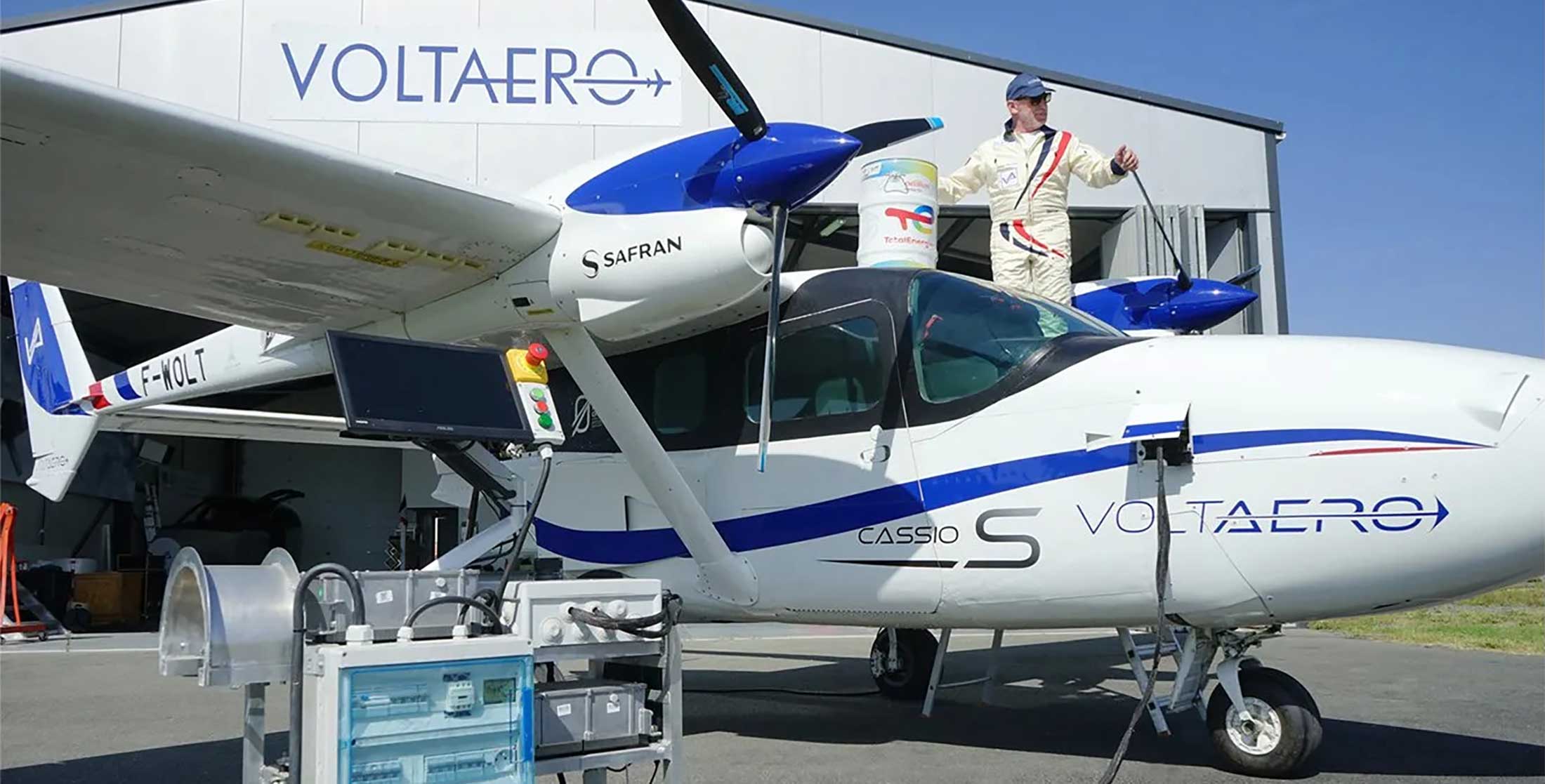VoltAero has successfully flown its hybrid-electric Cassio testbed using 100 percent sustainable aviation fuel (SAF) provided by TotalEnergies, the French start-up announced on September 21. According to the French start-up, this was the first time any aircraft with a hybrid-electric powertrain has flown on pure SAF, a biofuel that is typically blended with traditional jet fuel.
The company’s Cassio technology demonstrator, a modified Cessna 337 Skymaster, took off from VoltAero’s development facility in Royan, France on September 8. It was filled with TotalEnergies’ Excellium Racing 100, a biofuel made from winemaking waste collected in French vineyards, according to VoltAero. The same fuel has been used in automobile races since 2022 and reduces carbon dioxide emissions by at least 65 percent over its entire life cycle when compared with fossil fuel equivalents.
The flight lasted just over one hour, a company spokesperson told AIN. Before the flight, VoltAero tested the fuel on its ground test bench for more than three hours, they said. VoltAero would not disclose the cost of the fuel it acquired from TotalEnergies.
“Based on initial results, we calculated a truly impressive CO2 reduction of approximately 80 percent while operating the Cassio powertrain in its electric-hybrid mode and with the internal combustion engine fueled by TotalEnergies’ Excellium Racing 100,” said Jean Botti, VoltAero’s CEO and chief technology officer. “It underscores the opportunity for production Cassio aircraft to represent a major step closer to aviation’s decarbonization goals by replacing standard Avgas 100 high-octane fuel for aviation piston engines.”
While VoltAero’s hybrid-electric aircraft can operate solely on battery power during all phases of flight (taxi, takeoff, landing, and cruise), it has combustion engines that function as a range extender, recharging the batteries in flight. For short flights of up to 150 kilometers (90 miles), the aircraft does not require any fuel at all. In addition to enabling longer flights, the hybrid system can provide backup power if there’s a problem with the electric propulsion system.
VoltAero has been flying its Cassio testbed since 2020, but this was the first time it flew using biofuels or SAF. The SAF that is commercially available today is limited to a maximum blend of 50 percent biofuel, but aircraft OEMs have been flying various aircraft on pure SAF experimentally for years. For example, Boeing’s EcoDemonstrator made the world's first commercial airplane flight using 100 percent SAF in 2018.
TotalEnergies’ unblended SAF has also been used to power an Airbus A319neo test aircraft as well as an Airbus H225, which became the first helicopter to fly using 100 percent SAF in 2021. The company’s blended fuels have been available at Paris-Le Bourget, Clermont-Ferrand, and Bordeaux-Mérignac airports.
“This demonstration flight is part of our commitment to support players in the aviation sector for their decarbonization objectives,” said Joël Navaron, the President of TotalEnergies Aviation. “More broadly, it demonstrates our desire to continue our research and development efforts to offer an alternative to aviation gasoline containing lead, thereby meeting the challenges of general aviation’s decarbonization. We already have initiated several actions—such as the installation of several electric charging stations for general aviation aircraft, and the launch of a pilot program aimed at offering SP98-type fuel for compatible aircraft.”
VoltAero’s plans for decarbonizing aviation include a whole family of hybrid-electric Cassio aircraft and possibly even hydrogen-powered aircraft. Its first product will be the Cassio 330, a five-seat aircraft equipped with a four-cylinder, 165-kilowatt Kawasaki engine and Safran’s EngineUs 100 smart electric motor. The company revealed its Cassio 330 prototype at the Paris Airshow in June 2023 and intends to begin flight testing with it in 2024.
Subsequent Cassio models will include the six-seat Cassio 480 and the 12-seat Cassio 600. The Cassio 480 will use a six-cylinder thermal engine provided by Kawasaki. VoltAero has not yet announced which engine will power the larger, 600-kilowatt Cassio 600.
